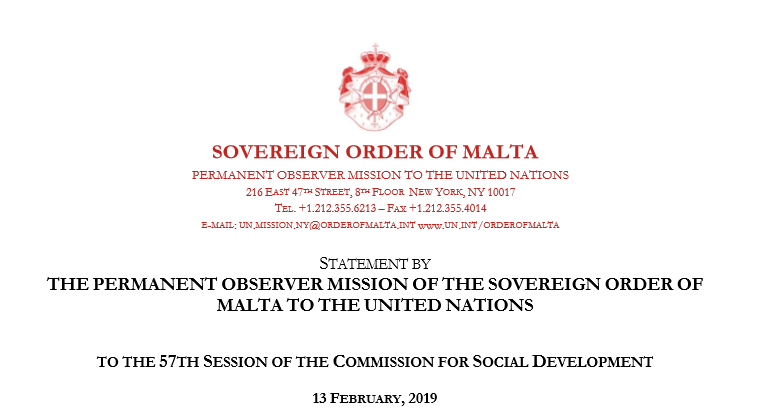
Mr. Chairman/Madam Chair,
Thank you for allowing us to take the floor today.
The Order of Malta has been committed to the care of the sick, poor and disabled for over 900 years. Today it operates over two thousand projects in 120 countries around the world caring for and upholding the human dignity of those in need through medical, social and humanitarian works. The humanitarian assistance provided by the Order is focused on the most marginalized and vulnerable persons around the globe irrespective of religion, ethnicity or nationality. The Order’s work truly echoes the 2030 Agenda to “leave no-one behind” and is continually evolving to respond to the specific humanitarian challenges of our time, which all too often are either caused or exacerbated by poverty, inequality and exclusion. Aligning with the main theme for this session of the Commission, I want to especially stress the situation of disabled people. We feel that identifying and implementing policies to assist, protect and include disabled people as full members of our societies is indeed one of the highest priorities.
Currently, around 15% of the world’s population lives with some type of disability, either physical or intellectual. We see the United Nation’s Agenda 2030 and the Addis Ababa action plan as major achievements in order to integrate, support and, as much as possible, empower these people with disabilities. Aligning with this goal, in many parts of the world the Order of Malta provides disabled people assistance with their daily lives, access to healthcare and education, and other basic services. We wish to especially underscore the severe situation of disabled persons who are affected by natural calamities, armed conflicts and other man-made disasters. Disabled people in affected regions are among the first victims of such crises. For, in addition to their suffering, those people face barriers to gaining access to fundamental services and assistance, including rehabilitation and assistive devices. In many countries, including in particular those in need of significant infrastructure development, few of the emergency and relief sites and facilities are accessible to persons with disabilities.
To conclude, we wish to highlight the importance of social inclusion of the disabled in our society, especially the most vulnerable among them, to allow them to live a life in dignity. Let us not tire in our actions to avoid stigmatization and discrimination and to redouble our efforts to promote policies for alleviating poverty and improving social protection, as well as more equal access to education and employment opportunities.
Thank you, Mr. Chairman/Madam Chair


